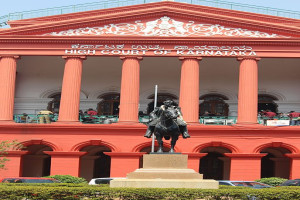
 By Shankar Raj*
By Shankar Raj*
Bengaluru: The capital city of Karnataka seems to be sitting on a bone-dry heap of political powder ready to be lit from two ends – one by the aggressive Muslim organisations like the Social Democratic Party of India (SDPI) and the other by Bharatiya Janata Party’s student wing, the Akhil Bharatiya Vidyarthi Parishad (ABVP) — over the hijab-saffron shawl issue forcing the police authorities to clamp section 144 in an around schools in Bengaluru hoping to fence the city from any flare-ups.
The prohibitory order came as the expected relief for the state government from the Karnataka High Court did not materialise as the single-judge bench of Justice Krishna Dixit referred the bunch of hijab petitions to a larger bench.
The decision came after Advocate General Prabhuling Navadagi, appearing for Karnataka, opposed the grant of any form of interim relief to allow students to attend colleges wearing hijab. “An interim order at this stage will amount to allowing the petition,” he told the bench.
Justice Dixit said: “The registry is directed to put [the matter] before the Chief Justice of the HC for consideration immediately. As there is urgency pleaded.” Justice Dixit also said that the question of interim relief will also be considered by the larger bench.
“Having regard to the enormity of questions of importance which are debated, the court is of the considered opinion that the papers be put in the hand of the CJ [Chief Justice] to decide if a larger bench can be constituted on the subject,” Justice Dixit said.
Navadagi argued that “The petitions are misconceived. They have questioned the government. Each institution has been given autonomy. The state does not make a decision. Therefore, prima facie, a case is not made out.”
“Children must attend the class adhering to the dress code prescribed by the college. There are large judgements, which say that hijab does not form an integral part of religious practice. The test that if they don’t practise the religion itself goes,” he added.
Advocate Sanjay Hegde, appearing for the petitioners, argued saying “There is nothing in Karnataka Education Act, which deals with uniforms. I went up and down. I did not find anything,” he said.
Meanwhile, vested interests kept the issue alive with large protests by hijab-wearing students in Kalburgi, Shivamogga and other places despite a 3-day holiday declared by the government for schools and colleges across the state.
Intelligence sources say that the organisations behind the hijab row are keen to bring the issue to Bengaluru in order to get international attention.
The intelligence inputs forced Kamal Pant, Commissioner of Police, Bengaluru, to release an order stating that since the possibility of a protest being held in the city cannot be ruled out, it is essential to implement proper security measures to maintain public peace and order.
As per the order, Section 144 of the Criminal Procedure Code will be imposed around schools, PU colleges, degree colleges, or other similar educational institutions in the Bengaluru city. The prohibitory order will be in effect for two weeks, from February 9 to February 22.
The prohibitory measures ban gathering or protest of any type within the area of 200 metre radius from the educational institutions.
Also read: Hijab row has nothing to do with religion, but everything to do with politics
Sources cautioned that issue might gain traction in the coming weeks despite the cosmopolitan nature of Bengaluru. They also pointed out that the hijab issue went for a tailspin in Udupi as the authorities did not cap the protests in the initial stage itself.
The hijab row that started as a stray incident spread to multiple districts in Karnataka as it was not controlled in the initial phase itself.
Rajeev Kumaramkanbath, assistant professor, sociology department, Christ (deemed to be University), told a newspaper that “Bengaluru is a volcano waiting to erupt. It is very urban, hence communal tensions are not seen on the surface. I am afraid there is a dangerous communal face hidden beneath Bengaluru’s urban carpet. It can be said that there are miscreants looking for an opportunity to cause communal disharmony, hence we must take action before anything goes out of hand.”
*Shankar Raj is former Editor of The New Indian Express, Karnataka and Kerala, and writes regularly on current affairs.





